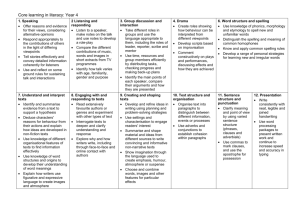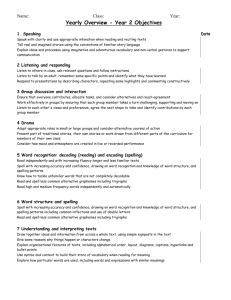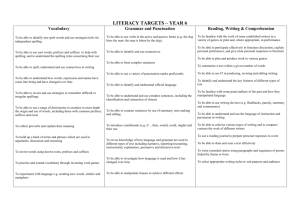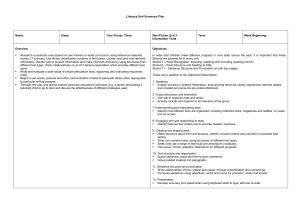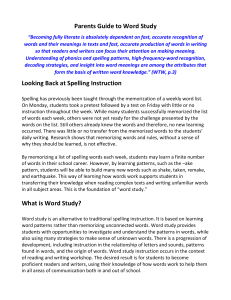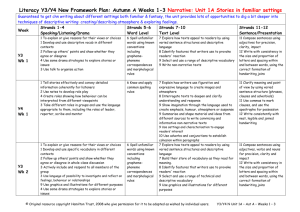Week - Hamilton Trust
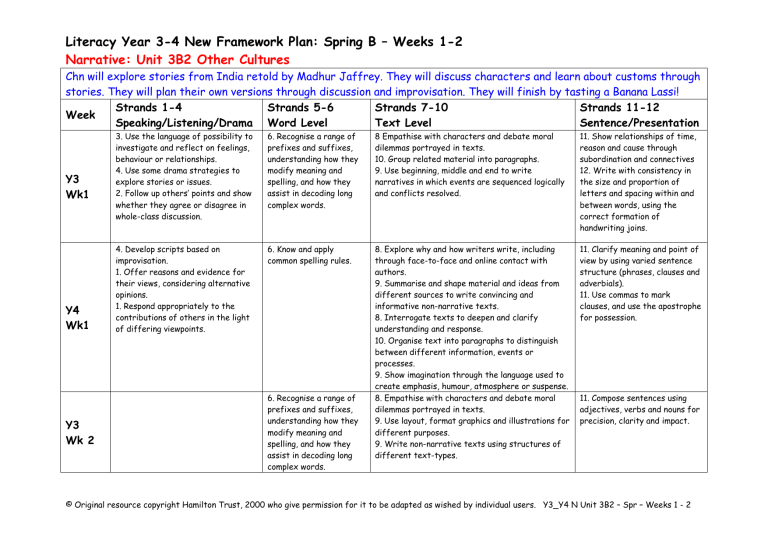
Literacy Year 3-4 New Framework Plan: Spring B – Weeks 1-2
Narrative: Unit 3B2 Other Cultures
Chn will explore stories from India retold by Madhur Jaffrey. They will discuss characters and learn about customs through stories. They will plan their own versions through discussion and improvisation. They will finish by tasting a Banana Lassi!
Week
Y3
Wk1
Strands 1-4
Speaking/Listening/Drama
3. Use the language of possibility to investigate and reflect on feelings, behaviour or relationships.
4. Use some drama strategies to explore stories or issues.
2. Follow up others’ points and show whether they agree or disagree in whole-class discussion.
Strands 5-6
Word Level
6. Recognise a range of prefixes and suffixes, understanding how they modify meaning and spelling, and how they assist in decoding long complex words.
Strands 7-10
Text Level
8 Empathise with characters and debate moral dilemmas portrayed in texts.
10. Group related material into paragraphs.
9. Use beginning, middle and end to write narratives in which events are sequenced logically and conflicts resolved.
Strands 11-12
Sentence/Presentation
11. Show relationships of time, reason and cause through subordination and connectives
12. Write with consistency in the size and proportion of letters and spacing within and between words, using the correct formation of handwriting joins.
Y4
Wk1
Y3
Wk 2
4. Develop scripts based on improvisation.
1. Offer reasons and evidence for their views, considering alternative opinions.
1. Respond appropriately to the contributions of others in the light of differing viewpoints.
6. Know and apply common spelling rules.
6. Recognise a range of prefixes and suffixes, understanding how they modify meaning and spelling, and how they assist in decoding long complex words.
8. Explore why and how writers write, including through face-to-face and online contact with authors.
9. Summarise and shape material and ideas from different sources to write convincing and informative non-narrative texts.
8. Interrogate texts to deepen and clarify understanding and response.
10. Organise text into paragraphs to distinguish between different information, events or processes.
9. Show imagination through the language used to create emphasis, humour, atmosphere or suspense.
8. Empathise with characters and debate moral dilemmas portrayed in texts.
9. Use layout, format graphics and illustrations for different purposes.
9. Write non-narrative texts using structures of different text-types.
11. Clarify meaning and point of view by using varied sentence structure (phrases, clauses and adverbials).
11. Use commas to mark clauses, and use the apostrophe for possession.
11. Compose sentences using adjectives, verbs and nouns for precision, clarity and impact.
© Original resource copyright Hamilton Trust, 2000 who give permission for it to be adapted as wished by individual users. Y3_Y4 N Unit 3B2 – Spr – Weeks 1 - 2
Literacy Year 3-4 New Framework Plan: Spring B – Weeks 1-2
Narrative: Unit 3B2 Other Cultures
Y4
Wk 2
Themes
6. Know and apply common spelling rules.
8. Interrogate texts to deepen and clarify understanding and response.
9. Use settings and characterisation to engage readers’ interest.
9. Summarise and shape material and ideas from different sources to write convincing and informative non-narrative texts.
10. Organise text into paragraphs to distinguish between different information, events or processes.
11. Clarify meaning and point of view by using varied sentence structure (phrases, clauses and adverbials).
Adjectives, alternative story endings, authors, autobiography, characterisation, classic stories, descriptive writing, instructions, myths and legends, narrative, note-making, oral discussion, persuasive writing, prefixes and suffixes, re-telling stories, role play, sentence types, spelling rules, story structure, summarising, thesaurus, verb persons, verb tenses, writing collaboratively.
© Original resource copyright Hamilton Trust, 2000 who give permission for it to be adapted as wished by individual users. Y3_Y4 N Unit 3B2 – Spr – Weeks 1 - 2
